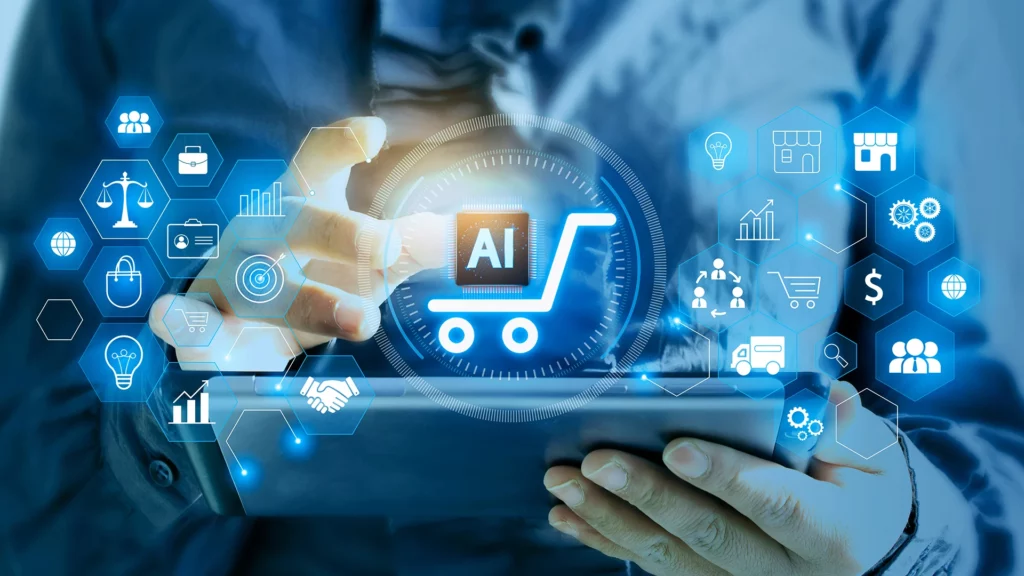In the digital age, ecommerce has transcended beyond mere online transactions, evolving into a sophisticated arena where personalized shopping experiences reign supreme. The advent of Artificial Intelligence (AI) has been pivotal in this transformation, heralding a new epoch where bespoke consumer experiences are not just valued, they are expected. This narrative delves into the role AI plays in sculpting these individualized journeys, interweaving the threads of machine learning and data analytics to tailor the digital landscape to the consumer’s unique preferences. We’ll explore the mechanisms of AI personalization, its tangible benefits in the ecommerce domain, and how it’s setting the course for the future of online shopping. Our foray into this topic is not just an examination of current trends, but a guidepost for businesses aiming to harness AI’s power to foster customer loyalty and drive growth in an increasingly competitive marketplace.
The Mechanics of AI Personalization
Peeling back the layers of AI-driven personalization reveals a foundation built on machine learning algorithms and vast pools of data. At its core, AI functions as a masterful artisan, meticulously crafting individual experiences by sifting through and analyzing customer behavior, preferences, and interactions. It’s a continuous loop of learning and adapting, with algorithms refining their accuracy with each data point collected. This intelligent data processing allows for the anticipation of customer needs, often before the customers themselves are aware of them. In ecommerce, such capability translates to showing the right product, to the right person, at the right time, elevating the shopping experience to new heights of customization. By demystifying the intricacies of AI, we gain insight into a tool that is reshaping the fabric of consumer engagement, making personalized shopping not a luxury, but a standard.
Personalization in Action: How AI Shapes the Customer Journey
The customer journey in ecommerce is no longer linear, thanks to AI’s intervention. From the moment of first contact, AI begins its silent choreography, aligning marketing efforts with consumer profiles through targeted outreach. This precision-targeted marketing ensures that consumers encounter products that resonate with their unique tastes and purchase history. As they browse, AI’s predictive algorithms curate a selection of products, tailoring recommendations that echo their desires and past behavior. This personalized touch extends to the checkout process, where AI streamlines transactions by predicting and facilitating consumer preferences, making the experience not just transactional, but relational. These subtle, yet profound, touches at each step of the journey signify AI’s transformative role in transitioning ecommerce from a service to an experience, one that feels less like a marketplace and more like a bespoke boutique crafted for each individual.
Benefits of AI-Driven Personalization for Ecommerce
The implementation of AI personalization in ecommerce transcends user experience, manifesting in measurable business benefits. Enhanced customer satisfaction, cultivated through these tailored experiences, often results in increased brand loyalty and customer retention. Retailers leveraging AI report upticks in conversion rates and a rise in average order value, as recommendations become more accurate and persuasive. Beyond immediate sales, AI-driven insights enable retailers to optimize their inventory, aligning supply with predicted demand. Marketing strategies also become more efficient as AI personalizes outreach, reducing expenditure on broad campaigns in favor of targeted interactions with higher conversion potential. These advantages underscore AI’s role not as a mere tool, but as a strategic asset that can significantly boost both top-line and bottom-line performance in the competitive world of ecommerce.
Overcoming Challenges in AI Personalization
As with any frontier technology, AI personalization comes with its set of challenges. Foremost is the consumer’s privacy concern; the fine line between personalization and intrusion is often a tightrope walk. Ecommerce businesses must navigate these waters with a keen sense of ethical data usage and transparency to maintain consumer trust. Balancing personalization with a non-intrusive user experience is equally critical—too much customization can be perceived as invasive, spawning discomfort rather than delight. Furthermore, AI must be meticulously designed to avoid biases that can skew personalization efforts, ensuring inclusivity and fairness. These obstacles are not insurmountable but require a conscientious approach to AI deployment, prioritizing the user’s welfare as much as business outcomes. For those seeking to master these complexities, partnership with an experienced ecommerce development agency can be invaluable. Companies like Elogic offer expertise to finesse the balance between personalization and user comfort, ensuring AI’s power is harnessed with a responsible touch.

Future Trends: The Next Frontier of AI Personalization in Ecommerce
Looking ahead, AI personalization in ecommerce is poised to expand its horizons, fueled by emerging technologies like augmented reality and the Internet of Things (IoT). These advancements promise a more immersive shopping experience, with AI integrating physical and digital touchpoints to deliver seamless omni-channel personalization. Imagine virtual fitting rooms powered by AI, providing size recommendations based on past purchases, or smart shelves in stores that highlight products as shoppers walk by, based on their online activity. As AI becomes more adept at understanding and predicting consumer behavior, the potential for hyper-personalized experiences that transcend channels is becoming tangible. This evolution will require ecommerce players to constantly innovate and adapt, ensuring that AI personalization strategies stay ahead of consumer expectations and continue to define the cutting edge of the shopping experience.
Conclusion
In sum, AI-driven personalization is not just a fleeting trend but the cornerstone of modern ecommerce. It’s a testament to how technology can enhance human interaction with brands, making every digital encounter feel personally crafted. The advancements in AI not only promise improved business metrics but also herald a new era of customer-centric shopping experiences. As we stand on the cusp of these technological advancements, it is imperative for retailers to embrace AI with strategic intent. The future of ecommerce, shaped by AI personalization, beckons a more intuitive, responsive, and satisfying shopping realm—one that resonates with the individuality of each customer. In navigating this future, continuous evolution and adaptation of AI strategies will be crucial in meeting and exceeding the ever-changing landscape of consumer demands.

